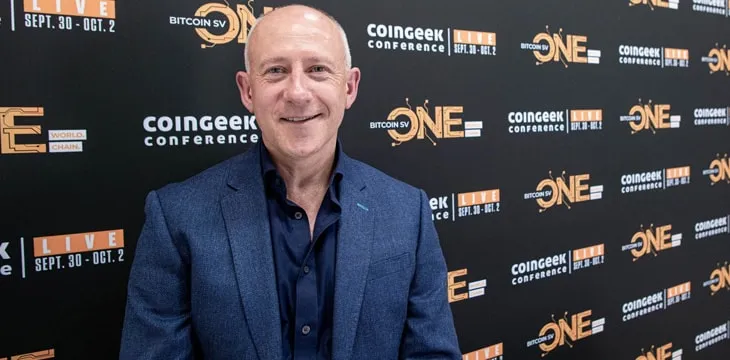|
Getting your Trinity Audio player ready...
|
At CoinGeek Live, GeoSpock announced that nChain had co-led a $5.5 million series A financing round in the company.
Following the announcement, we sat down with GeoSpock CEO Richard Baker to talk about GeoSpock, extreme data, future economies and where nChain fits into their vision for the future.
In your words, what does GeoSpock do?
GeoSpock is a deep-tech software technology company. We are founded and headquartered in Cambridge in the U.K. We have a particular focus on extreme data analytics environments—we’re an analytical database, and the role of that database is to deal with time series and spatial data that is generated from physical world devices: things like connected cars, IoT sensors, smart street lighting. So, we spend our time effectively translating physical world data into decision-making for governments and enterprises.
What is extreme data?
It’s difficult to dimension. We’ve had the era of big data, and I think big data is largely characterized as getting too big to keep on your enterprise’s servers on-site. This has given rise to cloud hosting, but even with that, big data there is still terabytes in size. What we are beginning to see is that the devices that are going through the rollout of IoT ultimately start looking like petabyte and exabyte-scale datasets. Extreme data is at least in the hundreds of terabytes and up to petabytes and beyond.
How does GeoSpock go from these massive data sets to meaningful information for decision makers?
It’s phenomenal. I’m a father of three young children, and I think about it in terms of what jobs they will be doing in the next 20 or 30 years. At one level, good technology is about hiding the complication, and so I think our job is to say, if we’ve got cities like London or Singapore that are beginning to put sensors on everything, meaning—believe it or not—geotagging trees, implementing IoT sensors in tarmac on the road in road gantry systems and putting up smart street lighting. You can almost visualize that every piece of infrastructure will have some kind of sensor that is producing event information.
Then, of course, the objects that are moving around those environments—cars, trucks, us with our mobile phones as citizens—are effectively producing event information and transaction information.
That data is so complicated to think about. It’s a huge mesh of information, so the job that GeoSpock has is about indexing all of that data. We index the metadata that comes from each discreet sensor, and by fusing that data together effectively and preparing it for analytics, we begin the process of transforming the data ready for different tools that can actually start to plan services.
So, using my children as an example, we already have things like Unity gaming engines being effectively the operations centers for smart cities. You’ve got an AR/VR headset on, and the operative is sitting in a drone chair, and effectively they are navigating the city in a 3D model and at any moment in time they can activate, within that 3D environment, an array of sensors that are somewhere in the city and say: show me the weather, show me traffic, show me congestion. What is happening now? And so, we are seeing gamification becoming part of how operating models for the real world will play out.
I’m trying to say that we have to ultimately hide the plumbing. We have to mediate how that data ultimately gets transposed for those kinds of tools to build services and applications.
Can you talk a little about how the kinds of data you are collecting has changes dramatically, even over the last few years?
Definitely. It’s really exciting.
I think that the kind of things that I talk about and we see with customers is that a number of things are beginning to collide with each other. We’ve seen the gig economy and the shared economy, for example, so the future of work is an interesting thing to think about, and an overlay to the digitization of industries.
If we are indeed in an era where nobody wants to own a capital asset—a house or a car—all of a sudden, in that model, choice is phenomenal. That could be the “I don’t need to have a particular brand of car, or phone, and I ultimately opt-in to new shared economy services that actually present that experience, and present that choice.”
I think the automotive industry is an easy one to think about for this. We are destined sometime in the next ten years to see electric autonomous vehicles be part of everyday life. And we won’t be buying them: they will be part of a shared economy service. Connecting this to Bitcoin SV, I think the way you access those cars will be through a digital wallet. My identity will be on my wallet and I will log in to that car somewhere in the city. I need that just for this moment in time for a family outing, or a trip to the beach—I won’t own that vehicle, but I will use it.
I think digital facilitation of that kind of service is what we’re seeing as part of this connection of devices.
What role does Bitcoin SV play in GeoSpock now?
I think the first big interrupt in that will be: why are we posting it to Amazon’s cloud service and not posting those files to Bitcoin SV and a digital ledger? That ledger is now synonymous with being a distributed database for those IoT events.
I think our interest in that collaboration with Bitcoin SV is around: okay, what’s our role in posting indexed data? And more importantly, how do we index data onto that distributed ledger?
In the first phase, we will see some early collaborations.
The next phase is that we’ve already got a lot of data sitting on Bitcoin SV around the world in the ledger, and analytics has not been a big focus area for that ecosystem. So, ultimately, how do you really start to extract the payload data?
A big challenge for the future is actually how do you run a financial query if I’m a big bank and I want to look at all the transactions that have happened for a global enterprise, I need to be able to execute a good old SQL query and I need to be able to query those financial files and get the result. If those transactions in the future are coming from devices of things that are creating the digital economy, then connecting that logic of indexing the data on the digital ledger, and then being able to query it in a distributed manner, is the other big opportunity.
The relationship you are describing with Bitcoin SV is more of a symbiotic one—could you talk about that?
Absolutely. If you’re sitting back, looking at history and Oracle or IBM, who invented databases back in the 60s or 70s, then Bitcoin SV is a modern database and that modern database is highly distributed around the world and we need to try and help enterprises get comfortable with using that database. Obviously, the heart of a database is how do you index the information and make it accessible. A big part of that, of course, is making it economic to use. Connecting those worlds is going to become really important.
With nChain leading the Series A funding round for GeoSpock, what does that mean for you?
It’s very significant in the fact that, firstly, I should probably say that we’ve got some amazing investors that sit alongside nChain. What nChain represented, really, was a strategic investor that I felt we could build a synergy around the long-term relationship between our type of technology and the ecosystem they were looking to build.
At the heart of that is that there are different types of investors in the world, and investors that really understand disruptive deep-tech are hard to find. I would say that nChain and the community around them are indeed that. They understand the disruptive nature around GeoSpock’s vision and understand the market potential.
But there are a lot of technology sequences to get through to unlock the real value that we all see. So, I’m delighted that they have strategically invested in the company and it will go beyond the money: it’s about having them as a board member, it’s about being able to spring-up technology peer reviews, about sharing our thinking about the things we are strategically planning, and making sure that our logic and approach ultimately does build synergies with the way that we think Bitcoin SV and that distributed ledger technology will play a part in society in the future.
It’s early days, but do you have any initial thoughts about how this relationship might work?
It is very early. Indeed, today is the day that we announced the transaction and we only had fresh ink a week ago.
We’re going to sit down over the next few weeks and months and ultimately collaborate on the long term roadmap and as you can imagine, we’ve already had a lot of shared thinking around the healthcare industry and had a lot of conversations around what’s going on in telco: the rollout of 5G networks is a very big opportunity for blockchain technology. And equally, smart cities and transportation.
Part of the roadmap will be technology roadmap planning but also business development and going to market. Between now and the end of the year, we’ve promised to get our first phase planned out and start to think about how we can develop solutions for 2021.
What we are attracted to with nChain is that deep tech expertise and the way that they have approached IP and patenting. I think the innovation that is around the corner in this world is amazing and them doing their diligence, making sure we are doing things correctly, is very attractive.
Watch GeoSpock’s presentation at CoinGeek Live 2020, Exploring the Opportunity to Digitise the Physical World with the Bitcoin Blockchain.
https://www.youtube.com/watch?v=cGcz1LLXMJY&feature=youtu.be&t=27549

 09-14-2025
09-14-2025 





